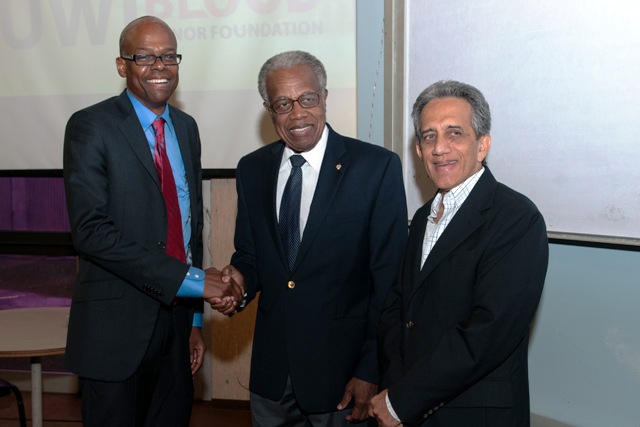News Releases
Encouraging Blood Donation to save lives
For Release Upon Receipt - November 11, 2013
St. Augustine
ST. AUGUSTINE, Trinidad and Tobago – A safe and reliable blood supply donated unconditionally and anonymously and used on a basis of clinical need would address many of the country’s medical needs. This is the view of Dr Kenneth Charles, Senior Lecturer in Haematology at The University of the West Indies (UWI) St. Augustine. Through The University of the West Indies Blood Donor Foundation (UWIBDF), which was formally launched on October 22, Charles hopes that regular voluntary blood donation by healthy members of the national and regional community is established.
Speaking at the launch, which took place at Amphitheatre B of the Eric Williams Medical Sciences Complex, Champs Fleurs, Associate Dean for Publicity and Special Projects and master of ceremonies for the evening, Dr Monica Davis welcomed guests and outlined the mission statement of UWIBDF: to save lives through research and education to promote voluntary blood donation and equal access to blood components.
Professor Samuel Ramsewak, Dean of the Faculty of Medical Sciences, saluted this UWI initiative in his address, which he says aims to “do the right thing for the right people at the right time.” He encouraged the involvement of the student body in raising awareness, which is seen as the missing component in previous attempts to achieve 100% voluntary blood donation in Trinidad and Tobago.
Dr. Bernadette Theodore-Gaandi, Caribbean Program Coordinator, The Pan American Health Organization, Office of Caribbean Program Coordination (PAHO/OCPC), delivered greetings and commendation from PAHO and the World Health Organization (WHO). She quoted data for the unequal distribution of safe, available blood between developed countries which collect the most blood due to voluntary blood donation, and developing countries which have most of the world’s population but collect least blood due to a paucity of voluntary blood donation.
The launch featured the performance of ‘Save a life”, written and performed by medical student, Erron Ramdass with accompaniment of classmate, Rexanne Bobb. Kasturi Harricharan, who suffers from thalassaemia major, an inherited blood disorder, also shared the challenges faced by her family and herself in finding blood every month.
Dr. Charles, who also serves as Founding Chairman of the UWIBDF, noted that a safe and reliable blood supply could improve the lives of patients who require repeated blood transfusions to stay alive and those, including foreign visitors, who have no relatives to donate blood on their behalf. In his remarks, he related the story of a UWI student who was involved in a motor vehicular accident and for whom needed blood was not readily available. He explained how donating blood only when needed by specified persons or for the right to reclaim it for named beneficiaries, could lead to blood shortages, unavailability and inequality, especially when access to donation is not equal. He also noted that there were dozens of children like Kasturi nationally who were in continuous need and could not keep pace with any requirement to provide blood donors.
He postulated that the reason for the disparity in blood donation between developed and developing countries could be that the seed of voluntary blood donation was first planted ninety years ago then fertilized by the awareness of need that came with the World Wars. This seed, he promised has now been planted as the UWIBDF and awareness will be raised through its activities.
For further information on the UWIBDF and to learn how to become a donor, please log onto http://uwiblood.com/
End
PHOTO

(L - R) Dr Kenneth Charles, Senior Lecturer in Haematology and Founding Chairman of the UWIBDF, University Chancellor Sir George Alleyne and Professor Samuel Ramsewak, Dean of the Faculty of Medical Sciences
About UWI
Over the last six decades, The University of the West Indies (UWI) has evolved from a fledgling college in Jamaica with 33 students to a full-fledged University with over 40,000 students. Today, UWI is the largest and most longstanding higher education provider in the English-speaking Caribbean, with main campuses in Barbados, Jamaica and Trinidad and Tobago, and Centres in Anguilla, Antigua & Barbuda, The Bahamas, Belize, British Virgin Islands, Cayman Islands, Dominica, Grenada, Montserrat, St Christopher (St Kitts) & Nevis, St Lucia, and St Vincent & the Grenadines. UWI recently launched its Open Campus, a virtual campus with over 50 physical site locations across the region, serving over 20 countries in the English-speaking Caribbean. UWI is an international university with faculty and students from over 40 countries and collaborative links with over 60 universities around the world. Through its seven Faculties, UWI offers undergraduate and postgraduate degree options in Engineering, Humanities & Education, Law, Medical Sciences, Pure & Applied Sciences, Science and Agriculture, and Social Sciences.
(Please note that the proper name of the university is The University of the West Indies, inclusive of the “The”, hence The UWI.)
For the latest UWI News, click http://sta.uwi.edu/news.
Contact
Marketing and Communications Department
- Tel.: (868)-662-2002 ext.82013/82014
- Email: marketing.communications@sta.uwi.edu

